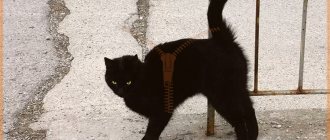12623Administration
2
The cause of death for cats can be serious illness, injury, old age, or an accident. Anticipating an imminent end, the animal often leaves its home, never to return. It is natural that the question arises why cats leave home to die. After all, even if the pet does not have the opportunity to leave the apartment, it simply hides in an inaccessible place, for example, somewhere in a closet.
There is no clear answer as to why this happens. There are several versions of this pattern, none of them have been scientifically confirmed.
Signs about the death of a cat
One of the ancient Persian treatises, dating back to the beginning of the 18th century, describes a version that says that a cat leaves the house before death so that the owner does not see its last terrible look. It can paralyze and even cause the death of anyone who meets the dying cat's eyes.
A lot of signs associated with the appearance of ghosts of cats and kittens before the death of relatives and close friends of those who saw them are described in world literature and historical documents, ranging from Cicero to the present day. The great philosopher believed that cats do not die completely.
It was the ancient Greek goddess of magic, witchcraft, the kingdom of the dead and moonlight, Hecate, who could turn into a cat. Cats left before their death to join the retinue of the goddess and become ghosts warning people about their imminent death. In Oldfield Gouway's book “The Nine Lives of a Cat. Myths and Legends" contains many stories related to cats. A cat paradise is even described, where the animal goes after its death.
The ancient Egyptians did not believe that a cat sought to hide from its owner in anticipation of death. The corpse of the pussy that died or died of old age was mummified and placed in its own tomb. There the cat could “wake up” and, accompanied by the beautiful goddess of the West, Amentet, climb the vertical staircase to heaven.
If the cat was timid and stopped at the last steps, then the gods Horus and Set would take her by the tender paws on both sides and lift her to Paradise. There she could live forever in a beautiful land, replete with rivers and lakes full of fish, with cozy houses that provided shelter. There were two more Paradises. The cat's soul went to the last Paradise together with its owners - the pharaohs.
Many peoples believed that the soul of a cat would help its owner get to Heaven. She is waiting for him on the border of Hell and Heaven and stretches out her paw to pull him out of Gehenna. The main thing is that the owner’s conscience does not have so many sins that a weak cat will not be able to overcome their weight.
In myths and legends about the death and posthumous existence of cats, the same duality was preserved as during her life. Some associated the cat with the devil's power and talked about vengeful ghost cats, about cats that turned into vampires and succubi after their death.
Others deified the pet and advised paying homage to it at the hour of death. Such a cat became a kind of guardian angel of the family and, with its appearance, warned of troubles and misfortunes. The philosopher and psychologist Marie-Louise von Franz wrote in detail about the reasons for such different perceptions of a pet in her book “Cat. A fairy tale about the liberation of femininity."
Having examined documentary sources from various eras and peoples, we can conclude that references to the fact that a cat leaves home before death are very rare.
Islam
Islam has its own explanation of where cats go after death. This religion teaches that all animals should be treated well and, if possible, taken care of. Muslims love cats and even revere them. After all, the Prophet Muhammad himself loved these animals very much. He had a cat with whom he drank water from the same container.
However, according to the Koran, cats have a soul, but it disappears after death. Only people who have led a righteous lifestyle can go to heaven. Animals live in accordance with the instincts inherent in them by nature. This means that they cannot make informed choices and be responsible for their actions. The soul of a cat does not need Allah's forgiveness, therefore, it does not need either heaven or hell. Therefore, after the death of a pet, it is simply destroyed along with his body.
If the cat dies at home
Perhaps there is so little evidence that cats leave their shelter before death because until recently these freedom-loving animals could roam freely, going about their business and returning back.
The death of a furry pet in the house, on the contrary, was considered atypical. Therefore, the signs associated with this sad event had a negative connotation.
In England there is still a saying that a cat should not be allowed to die in the house, otherwise its inhabitants will be haunted by troubles.
In the modern urban world, where strong doors and multi-story towers prevent cats from leaving the house when they want, this sign is no longer so popular. Not every owner can take a dying pet out of the house and into the street. Therefore, the sign has changed exactly the opposite.
A cat who dies in the house and was cared for until the last minute by loving members of the household becomes a talisman for the family. He will appear as a ghostly shadow to the owners, warning of danger, warding off the evil eye from the house, and extinguishing negativity.
It happens that furry pets die one after another in a certain family or home. The reason for this could be:
- carelessness of the owner, unable to provide the pet with normal living conditions;
- powerful negative energy, trying to cope with which the cat dies. Negativity can appear as a result of quarrels, scandals, a family curse or an external magical attack;
- The Brownie does not accept the new pet. If it cannot be expelled from the house, the animal dies from unexplained reasons.
The mystic and materialist will find among many parables and accept an explanation that satisfies him.
Reasons for the disappearance of adult cats
If young cats often find themselves in difficult situations due to lack of life experience, then older animals disappear for other reasons.
Many people in good spirits think that allowing cats outdoors is good for them. Unfortunately, available evidence shows that it is very dangerous for cats and fatal for many other animals. Cats that spend time outdoors can kill thousands of animals, even if they are well fed. A large number of cats also die in road accidents.
Damage caused by cats and the animals they hunt
This has real consequences that the authors have seen so many times. Cats allowed to roam outdoors are often at serious risk of being run over by cars, even in rural areas. Others are seriously damaged or mangled by cars. Outdoor cats are also vulnerable to the easy spread of disease and abuse from people.
Indoor cats often die of old age, while street animals do not have this luxury
If a cat has been living next to a person for a long time (more than 10 years), then old age will begin to manifest itself in its appearance and behavior. If we convert cat age to human age, we can say that a 15-year-old pet lived 76 human years. If a cat dies of old age, it is possible that she is not sick and therefore does not experience pain. This happens often, you just have to accept it. You can recognize the approaching death of an elderly cat by several signs:
- the cat is apathetic and sleeps a lot without leaving its favorite place;
- the animal stops eating and begins to lose weight;
- the cat is unhappy or does not react if you stroke it or pick it up;
- the cat begins to have poor orientation in space (it touches and bumps into objects, corners);
- the animal is breathing heavily, the pupils are dilated, the lenses are cloudy.
We suggest you read: How to calm a cat if she asks for a cat
No less often, cats die due to disease (healthy animals can die from an accident). The most common disease leading to death is kidney failure. This disease is typical for cats, especially neutered ones. Due to poor nutrition, metabolism is disrupted, leading to urolithiasis.
Males are more likely to suffer from kidney failure than male cats
Quite often, furry pets “burn out” from cancer. Perhaps this is one of the most painful diseases. The older the cat, the greater the risk of developing this disease, and the more painful it is. An old animal may suffer for several days. Cancer does not spare the weak. And young individuals can suffer for months.
If the body of an animal is found outside the home
If the pet's corpse is found outside the house, the signs are more favorable. Whether the deceased was the pet of the one who discovered it, or is it someone else’s pet, according to signs, such a find promises:
- quick financial receipts;
- successful trip;
- meeting your betrothed if the animal was white;
- a collision with an enemy if the corpse had black fur.
This favor of fate is explained by the fact that the owner is not involved in the death of the pet, and when dying, the furry protector takes all the troubles with him.
Maybe that’s why it is believed that cats leave the house before they die, so as not to cause moral suffering to the owner and not bring trouble to his family.
The opinion of modern animal psychologists
In all professional works of felinologists and zoopsychologists there is a warning - you should not transfer emotions, attitudes and motives of actions characteristic of humans to pets.
It is unlikely that in the last minutes of its life a cat will worry about the peace of mind of its owner.
First of all, any animal is guided by instincts. It is known that some predators, feeling sick and helpless, leave the pack or pride and go to a secluded place. The concept of mercy is alien to natural selection, and a weakened animal becomes easy prey for predators.
Even in a group of peaceful herbivores, there are cruel laws - fellow tribesmen can expel or kill a sick animal. So they have to look for a secluded place to hide and gain time for recovery.
Myths that cats have premonitions of their death are clearly exaggerated. According to Doctor of Biological Sciences Dmitry Zhukov, who studies the psychology and behavior of animals, if cats have a premonition of death, it is not sudden. Otherwise, city roads would not be strewn with the corpses of domestic “murks” and “balls”.
The scientist believes that leaving home is evidence of depression. After all, even a seriously ill person seeks privacy. Scientists do not know about “cat cemeteries,” therefore, it is not instinct that takes a fluffy one out of the house. For hundreds of years, there has been a myth that in the wild only elephants go to die in a strictly defined place. The legend about elephant cemeteries migrated from the stories of travelers to the pages of scientific journals, but it turned out that this was only a touching legend.
The scientist notes another feature of the behavior of a domestic cat. A cat walking on the street will not seek protection at the feet of its owner in any danger. He will most likely climb a tree or hide in the basement. A domestic cat perceives physical pain as an attack by an invisible enemy and hides from it in what it considers the safest place. So they find half-decomposed corpses of cats in basements, sheds, distribution booths and other secluded places.
Most “apartment” pets do the same. Unable to leave the house, the sick animal hides in a closet, pantry or under the sofa. This does not mean that Murka does not trust the person. But cats are animals with individual character traits.
There are also furry pets who, in difficult times, try to spend as much time as possible with their owner. It depends on the breed, character, degree of trust and well-being of the pussy. Knowing the signs of impending death is essential to facilitating the final moments of a family companion.
How do cats behave before they die in an apartment when they cannot leave?
If a cat feels unwell in an apartment, he acts in the same way as his brother who has access to the street. Only the world of a pet is limited to the walls of the apartment.
That's why the cat hides:
- under a bed or sofa;
- into the cupboard,
- to the pantry;
- under a bath or kitchen furniture.
The hidden animal should be found and taken to the hospital. Veterinarians will conduct a clinical examination, collect anamnesis, and examine urine and blood parameters. If owners carry out all recommended preventive procedures - timely vaccinations, flea protection, quarterly deworming, pets live to a ripe old age - twenty years or more.
In this case, the cause of the disease is a worn-out body that has exhausted all its resources. Further life is a period of torment, which the veterinarian will propose to interrupt through euthanasia, during which the pet will fall asleep and not wake up.
Alarming symptoms
The average domestic cat lives 12-15 years, but some breeds are long-lived. Cats have been recorded to live 20-25 years.
Outbred animals are more resistant to diseases, as are breeds in the creation of which humans intervened minimally.
But decorative breeds are less viable. They die more often from genetic diseases. Therefore, age cannot serve as a 100% sign of approaching death. But if the pet has reached a critical age, and, in addition, there are other signs of a disorder, then it is worth consulting with a veterinarian.
These symptoms include:
- rapid or difficult breathing. Normal breathing rate at rest is 20-30 times/min. You need to observe how the sides of the animal move and count the number of breaths in 30 seconds, multiplying the result by 2;
- dilated pupils, clouded, fixed gaze;
- open mouth, protruding tongue;
- decrease in heart rate. In a healthy animal, the pulse is 140-220 beats/min. You can check your heart rate by feeling the blood beat in a large artery under the front left paw of the pussy;
- the cat loses its appetite, it stops eating and drinking, loses weight, becomes weaker;
- the coat looks matted, dull, and may fall out;
- excretory functions are impaired - the amount of urine and feces decreases;
- the body is poisoned by accumulating toxins - the urine is dark and foul-smelling. An unpleasant odor emanates from the mouth;
- the animal hides in secluded places, avoids the usual contacts - stroking, games.
Signs may vary if an older cat has chronic illnesses. But sometimes cats, before dying, cuddle up to their owner and even try to play with him. Any behavior unusual for a pet should alert its owner and become a reason for an emergency examination by a specialist.
Buddhism
Buddhists do not believe in the existence of the soul. For them, everything around is one big stream of Consciousness, which takes on various incarnations. Every living creature and even inanimate object has a piece of it. Therefore, heaven and hell do not exist in Buddhism. According to this religion, heaven and hell, both for humans and for cats, are a psychological state that everyone chooses for themselves. After death, the pet's soul is reborn and ends up in one of the worlds. This could be the world of hell, people, animals, hungry ghosts, lower or higher deities. The place of future incarnation also depends on the actions of the cat, that is, on how pure its karma is.











